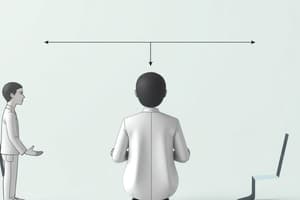Podcast
Questions and Answers
What role do central traits play in impression formation according to Asch's configural model?
What role do central traits play in impression formation according to Asch's configural model?
- They are the most significant in shaping overall impressions. (correct)
- They only influence impressions if presented last.
- They serve no role in creating impressions.
- They are less influential than peripheral traits.
What is a fundamental characteristic of schemas?
What is a fundamental characteristic of schemas?
- They are always accurate reflections of reality.
- They can only be formed based on extensive knowledge.
- They represent our knowledge about a specific concept. (correct)
- They are static and do not evolve with new information.
How does the primacy effect influence impression formation?
How does the primacy effect influence impression formation?
- First impressions are often overshadowed by subsequent impressions.
- Later information becomes more important than earlier information.
- The first information received has the greatest impact on perception. (correct)
- Impressions are formed randomly, regardless of the order of information.
What is suggested by the negativity bias in impression formation?
What is suggested by the negativity bias in impression formation?
What type of schema is specifically related to how we perceive ourselves?
What type of schema is specifically related to how we perceive ourselves?
Which cognitive process is primarily described as a shortcut for making quick judgments?
Which cognitive process is primarily described as a shortcut for making quick judgments?
In the context of social psychology, what are social cognitions?
In the context of social psychology, what are social cognitions?
What is the impact of peripheral traits compared to central traits in forming impressions?
What is the impact of peripheral traits compared to central traits in forming impressions?
What type of cognitive structure helps individuals fill in gaps of missing information?
What type of cognitive structure helps individuals fill in gaps of missing information?
What does the availability heuristic lead people to do?
What does the availability heuristic lead people to do?
What is a characteristic of implicit personality theories?
What is a characteristic of implicit personality theories?
Which factor primarily determines the formation of a schema?
Which factor primarily determines the formation of a schema?
When contrasting primacy and recency effects, what is essential to recognize?
When contrasting primacy and recency effects, what is essential to recognize?
What major impact does the introduction of a lecturer have on students' impressions?
What major impact does the introduction of a lecturer have on students' impressions?
Flashcards are hidden until you start studying
Study Notes
Social Psychology
- Studies how people think, feel, and behave.
- Focuses on how these three elements are influenced by others.
Social Cognitions
- Automatic cognitive processes that influence social behaviour.
- These influence how we think, feel, and behave without conscious effort.
- Hogg and Vaughan's definition of social cognition:*
- Cognitive processes and structures that influence and are influenced by social behaviour.
Impression Formation
- How we form impressions of others based on their behaviour and characteristics.
- Impressions influence our decision-making.
Asch's Configural Model
- Central traits: Have a significant impact on impression formation.
- We focus on these traits and use them to make assumptions about other characteristics.
- Peripheral traits: Have a smaller effect on impression formation, often influenced by central traits.
- Example:** Perceiving a new person as "warm" can lead to assumptions about their other qualities like friendliness and trustworthiness.
Impressions in the Classroom (Kelley, 1950)
- Study demonstrating how simply introducing a lecturer as "warm" or "cold" significantly impacted students' impressions of him.
- Students who were told the lecturer was warm perceived him as more sociable, friendly, and deserving of attention, compared to students who were told he was cold.
- Example of how first impressions can bias subsequent perceptions.
Impression Formation Biases
- These biases can influence our judgments about others.
Primacy and Recency Effects
- Primacy effect: The first piece of information we receive about a person has a disproportionate influence on our impression.
- Recency effect: Information received most recently has a greater effect on our impressions, especially in situations with a lot of information.
Positivity and Negativity Biases
- Positivity Bias: We generally assume positive characteristics about others in the absence of information.
- Negativity Bias: Negative information has a stronger impact on our overall impression, even if positive information is also present.
- This is likely due to evolutionary factors, as negative information was crucial for survival.
Implicit Personality Theories
- We assume that certain characteristics go together to form specific personality types.
- These theories vary across cultures.
- Example: If we perceive someone as "intelligent", we might also assume they are "organized" and "ambitious".
Schemas
- Cognitive structures that represent our knowledge about specific concepts.
- Schemas are a collection of beliefs, attitudes, and thoughts about a person, situation, or event.
- They help us quickly process information and form impressions.
- Example: A schema about "lecturers" might include expectations like wearing glasses and dressing professionally - influencing our judgments, even if the actual lecturer doesn't fit the stereotype.
Types of Schemas
- Person schemas: Represent our knowledge about specific individuals.
- Role schemas: Represent our knowledge about social roles (e.g., doctor, student, teacher).
- Event schemas (scripts): Represent our knowledge about common events (e.g., going to a restaurant).
- Content free schemas: Help us understand abstract concepts such as morality.
- Self schema: Represents our knowledge about ourselves, influencing our self-esteem, goals, and behavior.
Self Schemas
- How we view ourselves can significantly influence motivation, goal setting, behavior, emotions, and social relationships.
Heuristics
- Cognitive shortcuts or mental rules of thumb we use to make judgments quickly, particularly under time pressure or when faced with lots of information.
Availability Heuristic
- We estimate the frequency of an event based on how easily we can recall examples.
- Example: We may overestimate the risk of being spiked in a drink if recent media reports are easily accessible, even if the actual risk is low.
Anchoring and Adjustment Heuristic
- We rely on an initial piece of information (the anchor) to make a judgement, adjusting our estimate only slightly.
- Example: If we are asked to estimate the number of countries in Africa, we will be likely to start with our initial (anchored) information - perhaps a number we heard previously - and adjust it only slightly.
Studying That Suits You
Use AI to generate personalized quizzes and flashcards to suit your learning preferences.



